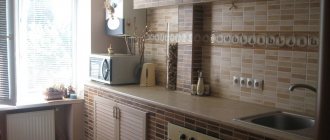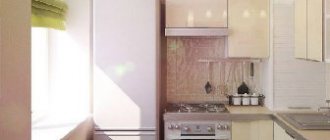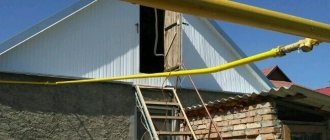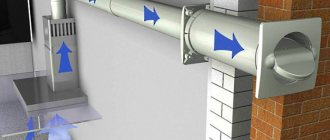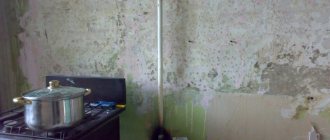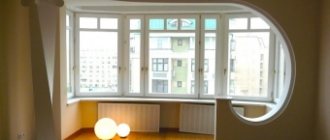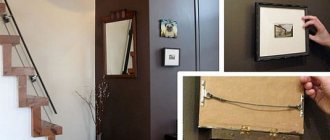Good afternoon, dear reader! Gas is what we use every day in everyday life and what provides us with comfortable life activities: quick preparation and heating of food, heating water and heating the home. Interruptions in its supply are extremely rare, since our country has large reserves of resources and well-designed networks that allow us to avoid large-scale accidents.
But gas supply systems also have a drawback - they are not an aesthetically pleasing type of communication. However, there are many ways to hide a gas pipe in the kitchen without violating the operating rules.
Why hide pipes?
Gas pipes mainly run through the corridor and kitchen of most apartments and private buildings. This makes it possible to gain more direct access to gas, which is used for cooking and heating the room.
However, its not very aesthetic appearance can easily ruin the interior of any room. Therefore, it is necessary in a timely manner, even at the stage of planning the placement of furniture and decorative elements in the kitchen, to also take care of masking gas communications.
Practical guides
Another great idea to divert attention from the pipes is a railing system. Metal, cylindrical slats are hung horizontally along the work wall and hold kitchen utensils on special hooks.
Painted the same color as the gas pipe, they create the impression of two parallel rails and do not create the feeling of a technical room with a pile of various devices. Simple and concise.
Methods for masking pipes
There are several ways to solve this problem:
- cover the gas pipeline with kitchen furniture. Behind the wall cabinets of the kitchen unit you can completely hide both the pipes and the gas water heater and meter. To do this, dismantle the rear part or remove the side wall of the cabinet. The meter and gas pipe will not take up the entire volume inside the cabinet; there will still be enough space left to store kitchen utensils or food. For a disguise option using wall cabinets, watch the video:
- install a box made of plastic, plasterboard, polycarbonate or chipboard. The box is a lightweight structure that is mounted on a metal frame profile and guides. Its installation will cost less than purchasing a new kitchen set;
- use a railing system. The railing is used to disguise the gas pipe when it runs across the entire width of the wall at the level between the countertop and wall cabinets. This makes it possible to use it as a hanging structure for placing light kitchen utensils, hooks, shelves and drying racks on it. In this case, the pipe is cleaned to a shine, and then covered with chrome paint in several layers;
- decorate pipes. Masking in this way does not require the creation of any structures from various materials, inside of which elements of gas communications will be located. To paint a gas pipeline to match the furniture or wallpaper, you can use any waterproof paint, and also apply decorative painting to the surface of the pipes.
Which way is better
The simplest, most economical and optimal from a safety point of view for masking gas pipes is the decoration method. In this case, there remains free access to the gas communications for preventive inspections and maintenance.
In addition to budget painting, you can use various improvised means and modern finishing materials to decorate gas pipes:
- cardboard sleeve;
- decorative painting;
- interior mosaic;
- wallpapering the pipe;
- decoupage method;
- twine or twine;
- bamboo panels.
Decorative design
Painting
The most budget-friendly and simplest option is painting. It is not necessary to choose a color to match the wall; you can come up with more original solutions. Let me note that this is a fascinating and creative process. You just need to use your imagination or be inspired by other works. And your hated pipe will turn into a stunning art object. It is worth remembering that you need to paint with specially designed paint. This way the coating will lie more evenly and the surface will look neater.
Monochromatic painting to match the wall color.
Plain paint in contrast with the wall.
Decoupage
You will need a special film for decoupage (can be purchased at a craft store) or regular napkins with a suitable pattern. It is necessary to first clean the surface of the pipe. Then apply glue and place a napkin on top. Cover the top of the napkin with a second layer of glue until it is sufficiently saturated. The last step is fixing with varnish.
Decorative painting
If you draw beautifully, you can paint a pre-painted pipe with decorative patterns or ornaments. This will give your interior a special uniqueness.
Decorative painting.
Do the work yourself or call a professional
Cheaply painting a pipe or decorating it with decorative elements without violating safety regulations is not difficult for a person with taste and a little skill in painting work.
For other methods of masking gas communications, you should invite a specialist. Saving on the costs of providing professional services in cases where there is a potential danger of an explosion and the risk of loss of human lives is absolutely not justified, and in apartment buildings, where not only members of your family, but also neighbors may suffer, it is even criminal.
Regulations on masking gas pipelines
Safety rules dictate that the following standards be observed when masking gas communications:
- It is strictly prohibited to unauthorizedly move gas pipes in the kitchen, an exception may be the case when you already have permission from the relevant government services;
- When installing wall cabinets around a gas pipeline, it is necessary to prevent their pressure on the pipeline, leading to damage to the system. To do this, there must be a gap of at least 1 cm between it and the wall of the kitchen cabinet;
- the pipes should not come into contact with the walls of the box, the gap between them is at least 5 cm;
- part of the box must be removable so that quick access to the pipes remains possible;
- the box lining must contain a perforated element or a grille to ventilate the internal space;
- gas pipes must be pre-painted - this will protect them from corrosion and extend their service life;
- Do not use gas pipes as a hanger, support or stand for heavy objects, even for a short time.
Overlays
You can use decorative overlays. These are removable, small boxes that provide access to communications at any time. From the outside, they can be decorated at will to match the overall design of the room or to create contrast.
Note!
- Kitchen with gas stove: design features, photos of the finished renovation
How to make a kitchen with your own hands - examples of beautiful and modern renovations
Assembling a kitchen - step-by-step DIY assembly guide, necessary materials and tools
An alternative to the box can be attached shelves and cabinets with drawers that can be moved to the side as needed. Or, as an option, use separate, open shelves attached to the wall just below the pipe location.
They display bright, colorful household items for spices. Thus, by focusing on colorful decor and masking communications, you can make the kitchen interior more attractive.
Prohibited techniques for masking a pipe
There are many ways to disguise a gas hose or pipe in the kitchen, but not everyone can be used in a specific situation. Since cutting or moving parts of the gas pipeline is strictly prohibited. Such work should only be carried out by a qualified gas fitter from the service that maintains this house.
According to the requirements of SNiP for the installation of gas supply systems, it is prohibited:
- hide gas pipes under a sealed casing or permanent box;
- embed into walls;
- attach cabinets to the gas pipe, and not to the walls using hinged hinges;
- insert the pipe into the ventilation ducts.
It is necessary to follow this rule, first of all, for safety reasons.
If the area around the gas pipeline is completely closed, then gas will accumulate in it if it leaks.
Embed into the wall
In this case, it is necessary to perform more manipulations than in the second option, but the result will be very comfortable.
So, an easy way to hide the counter in the wall is to use drywall. In this material it will be quite easy to cut out a convenient window in which the gas meter will be “placed”. In addition, it is convenient to hide wires and pipes under the drywall. Then it turns out that the device is hidden in the wall. And to provide access to the necessary elements, a plastic screen-door or small roller shutters are installed. As a result, the device is not visible, and access to it is convenient, and the interior of the kitchen can be customized to suit every taste.
The second way is to make a niche in the wall itself. But, this procedure is not very convenient and will require a lot of effort, because more channels will need to be made for the pipes. A non-professional is unlikely to be able to do this, and what’s the point if there are good alternatives.
Requirements for materials for sealing pipes
To seal gas communications, you need to use materials that have the following properties:
- light weight. Light material does not require the construction of a massive frame; ordinary metal or wooden slats can be used;
- moisture resistance. High humidity in the kitchen usually occurs during cooking and affects the materials used to furnish it. Therefore, preference should be given to those options that are more resistant to moisture and retain their shape when wet;
- resistance to chemical reagents. During the cooking process, grease and dirt will settle on the surface of structures located in the kitchen, which are quite difficult to wash off without the use of household chemicals. Therefore, the materials used to mask pipes must withstand direct contact with detergents.
Do-it-yourself pipe masking
Installing a special box allows you to give the kitchen an aesthetic appearance and does not require significant financial costs. This simple method allows you to hide not only pipes, but also the chimney and equipment included in the gas supply system: gas meter and boiler.
The main advantages of this method include:
- ease of assembly and installation;
- aesthetic appearance;
- reasonable cost.
In addition to tangible advantages, there are also a number of disadvantages in this option of masking elements of the gas supply system:
- the box will take up part of the free space, so it is not advisable to install it in a small kitchen;
- access to the gas pipeline becomes difficult, which is a violation of basic safety rules;
- When repairing the gas system, it will be necessary to completely replace the box.
Required tools and materials
To make a box, you need to prepare in advance a set of tools consisting of:
- screwdriver;
- profile for leveling;
- knife or metal scissors;
- tape measure and marker.
As the main material, you can use plasterboard sheet, plastic panels, plywood or chipboard, metal profiles, as well as fasteners - self-tapping screws or self-tapping screws.
Work progress
The process of making a plasterboard box consists of several stages.
- calculation and marking of the structure. The box being constructed must completely cover gas communications and equipment, and it must also allow easy access to them. Therefore, the calculation must be performed in such a way that there is enough free space inside the structure to access any component of the system;
- installation of metal profile. The profile should be cut into pieces of the required length and secured to the walls using self-tapping screws;
- fixing drywall. GKL sheets are cut with metal scissors into blanks of the required size, which are attached to profiled planks with self-tapping screws or self-tapping screws;
- eliminating chips and gaps with polyurethane foam;
- Finishing work. Drywall can be puttied and painted or decorated in the style of decoupage, which consists of gluing the surface of the box with special film napkins. To paste the structure, you can also use any textile or glossy paper, followed by applying a varnish coating.
Wildlife in the kitchen
Some housewives use fresh and artificial weaving flowers to disguise unsightly structures. Long branches wrap around the pipes and create a cozy atmosphere.
To improve the visual effect, the pipe is wrapped with twine, placing each turn tightly against the previous one. The end of the rope is fixed with glue. You can decorate such a pipe with branches of artificial flowers, insects, and butterflies.
Expert advice
On construction forums, experts most often answer the following questions:
- Is it possible to cover a gas pipe with drywall? Yes, you can. However, you need to choose moisture-resistant grades of plasterboard with a thickness of 10 - 12 mm.
- Is it possible to hide a gas pipe in the wall? No you can not. Free access to the pipe must be provided;
- Is it possible to cover a gas pipe with a suspended ceiling? Yes, it is possible if you use a stretch ceiling of a more complex configuration, when the passage of gas communications is covered with a decorative plasterboard box.
Important Rules
Anyone who is going to hide communications must take into account one important rule.
You can hide pipes, a counter, a column. But! All units must be provided with free, easy access at all times. It is forbidden to tightly sew up communications.
This means that the gas pipeline can only be hidden with removable structures, for example, a special casing or fire-resistant plasterboard box. But it is prohibited to hide it in grooves or in the thickness of the wall.
Depending on the style of the kitchen, you can use the equipment in different ways.
Such a box should be easily and quickly removed to allow inspection and repair of gas services.
If communications could be transferred, then perhaps the problem would be solved much easier. But such a service is often expensive, and permission for it is very rarely issued.
Common mistakes
Beginners often make mistakes when decorating a gas pipeline, which result in fines from specialized services or emergency situations:
- do not provide an inspection hatch in the box that provides access to the gas tap and meter;
- change the location of pipelines without permission from gas workers;
- after receiving permission, they carry out the transfer of the riser with their own hands, without involving an organization that has a license for this type of activity. It will be practically impossible to legalize independent redevelopment in Gorgaz;
- plasterboard of low moisture resistance is used to make the box.
Work examples
Examples of different options for masking gas communications are presented in the photo:
Gas riser hidden behind the kitchen cabinet door:
Examples of decorating gas pipeline elements:
Railing:
Installation of guides for a plasterboard box:
